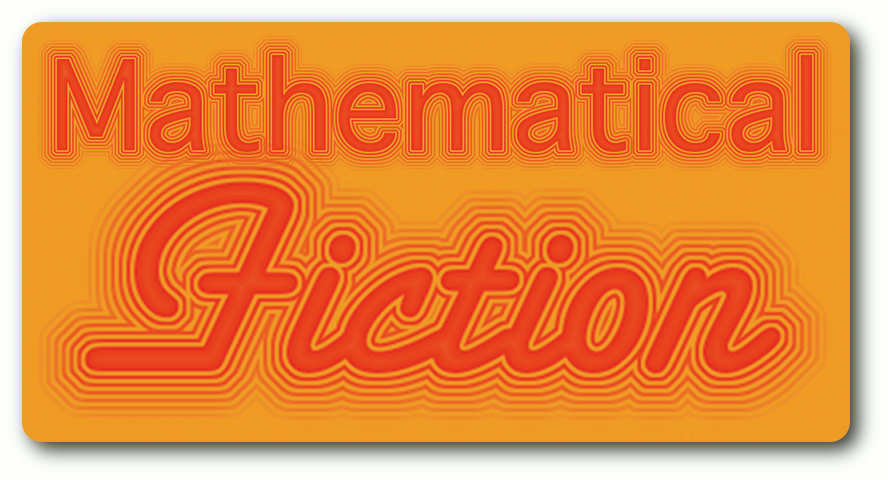
a list compiled by Alex Kasman (College of Charleston)

a list compiled by Alex Kasman (College of Charleston)
| Home | All | New | Browse | Search | About |
| ... |
|  |
| ... |
| Cas Russell, the math-genius mercenary, returns in the sequel to Zero Sum Game. As before, she can perform calculations quickly and accurately enough to determine exactly how she needs to swing, kick, and jump so as to fight like a real comic book superhero. In this novel, she also uses her mathematical abilities to figure out how to deploy her plan of reducing violent crime in Los Angeles by slightly altering the mental states of everyone living in Los Angeles. But, in regards to this website, it is the role of mathematical proof rather than raw calculating power that is the biggest difference between this book and its predecessor.
I'm not sure I can say much more than that without introducing some mild spoilers. So, let me urge anyone who wishes to be completely surprised by all of the twists and turns in this series to stop reading this page now.
As in the case of Zero Sum Game, the title of this book is a bit of mathematical terminology that appears once in the text. In this case, "null set" is how Cas Russell half-jokingly describes the set of people who know who she is. In other words, she is suggesting that her history is a mystery to everyone, even to herself. It appears that this isn't quite true; some of the other characters seems to know who she really is, even if she doesn't. But, her own ignorance of her origins is certainly a major driving force of the plot in this sequel. (In the same passage of the book that she talks about "the null set", the author also tries to make an allusion to Russell's paradox which -- despite being appropriately named for this character -- did not quite work for me.) Because of the mental tampering by a psychic working for the evil company Pithica near the end of the first novel, Cas is becoming overwhelmed with flashbacks of memories from her previous life. She sees herself talking to people in situations she does not remember. Some of those people are characters we know -- like the fundamentalist assassin, Rio -- and other are ones that neither she nor the reader recognize at first. These visions become so frequently that they begin to interfere with her mathematical abilities, putting her and her friends in danger. We are told that her ability to construct mathematical proofs suffers even more than her ability to calculate.
(Is this just a convenient plot device that still allows her to fight like Daredevil, or does it say something intentional about the relative difficulty of computation versus proof?) Despite this inability, she is still able to recognize some flaws in an algebra proof in a research article she was reading just for fun. So, she posts criticism of the article and signs it using the name "Sonya Halliday". When first encountered, this anecdote seems to be an entirely irrelevant aside having nothing to do with the main plot. It gets tied together later when Sonya Halliday, an African-American math professor who happens to be an acquaintance of her P.I. friend, shows up at Cas's place. It is not just that she is angry about Cas posting things under her name. The real point is that Sonya has figured out from reading her posts who Cas Russell really is. There was a Bahranian prodigy who "had the math world all a-buzz" before she suddenly disappeared and Sonya somehow recognizes her style in the criticisms that Cas posted and realizes the two people are one and the same. [There are two things I'm not following here. Perhaps I didn't read carefully, or maybe it will be explained later, or maybe it was just poorly written. The fact that the private investigator Arthur happens to be working with a math superhero and also is friends with a math professor seems like an unexplained coincidence. And, I'm not sure how Sonya is meant to have connected Cas and this Bahranian prodigy from the criticisms she posted. Was her mathematical style really so recognizable that Sonya could be certain she and Cas were the same just from reading these criticisms of the published errors? Couldn't Cas Russell just be someone who had read and was influenced by the prodigy's writings?] In any case, I'm glad that mathematical proof plays a role in this book because math is much more than simply computation to me. Of course, there is also much more to the novel than this bit about mathematical proofs. There is war between the crime syndicates of Los Angeles, moral ambiguity about the ethics of tampering with people's minds, and lots more fight scenes that could possibly only be written by S.L. Huang who "has a math degree from MIT and is a weapons expert and a professional stunt woman..."
|
| More information about this work can be found at www.amazon.com. |
| (Note: This is just one work of mathematical fiction from the list. To see the entire list or to see more works of mathematical fiction, return to the Homepage.) |
| |||||||||||||||||||||||||
| Home | All | New | Browse | Search | About |
Exciting News: The 1,600th entry was recently added to this database of mathematical fiction! Also, for those of you interested in non-fictional math books
let me (shamelessly) plug the recent release of the second edition of my soliton theory textbook.
(Maintained by Alex Kasman,
College of Charleston)